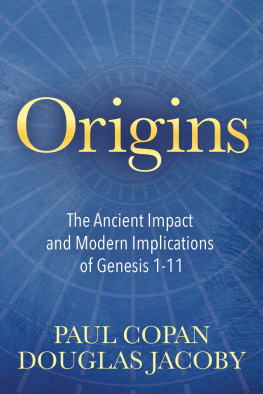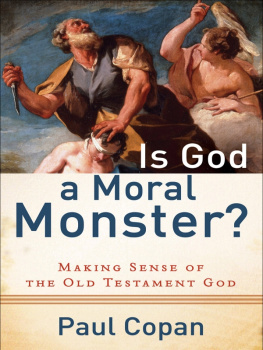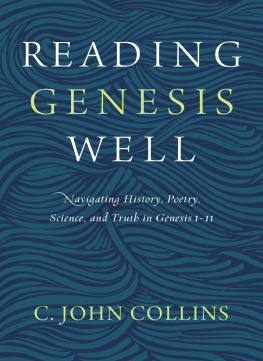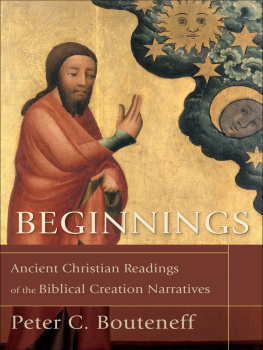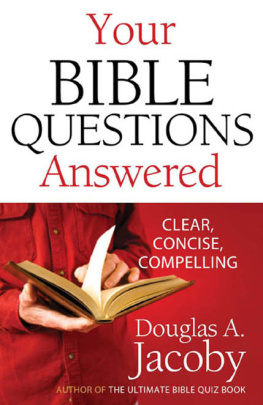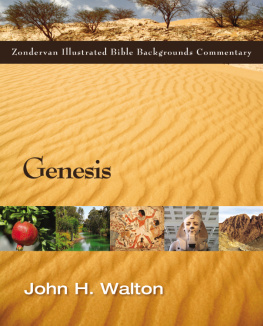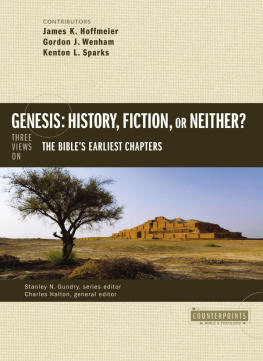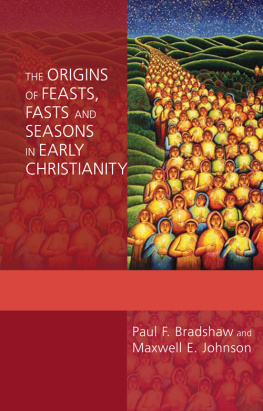P RAISE FOR O RIGINS
Genesis 111 is the foundation of the book of Genesis, which is the foundation of the whole Bible. These chapters provide the critical background for the story of Abraham, whom God would use to bring blessing to the whole world. This important part of Scripture is, however, difficult to understand. Paul Copan and Douglas Jacoby use their considerable skills to bring insight into the meaning of these chapters. I recommend Origins to everyone who is serious about their faith.
Tremper Longman III , Distinguished Scholar and Professor Emeritus, Westmont College
In Copans and Jacobys characteristically engaging style, this book successfully addresses key issues in one of the most important but controversial areas that has challenged believers faith.
Richard S. Hess , Distinguished Professor of Old Testament, Denver Seminary
This is a remarkable book. The authors admirably meet their goal of writing in such a way that, even if one does not agree with every interpretive conclusion they come to, the biblical and extra-biblical materials from the ancient world are introduced with care and clarity. This very well written volume will carry believers through a flood of deep waters in the reading of these early chapters of Genesis. All along the way, however, there is a constant concern for the spiritual welfare of the reader, that we might all grow mature in the grace of God in Christ, our creator and our redeemer.
Richard E. Averbeck , Professor of Old Testament and Semitic Languages Director, PhD in Theological Studies, Trinity Evangelical Divinity School
An excellent, eminently readable introduction to the challenges and benefits of reading Genesis 111 as a genuinely ancient (specifically ancient Near Eastern) text. The authors do a great job of helping the reader understand why making the effort to read in this manner is actually beneficial .
Iain Provan , Marshall Sheppard Professor of Biblical Studies, Regent College, Vancouver (Canada), and author of Seriously Dangerous Religion: What the Old Testament Really Says and Why It Matters
Origins
Origins
The Ancient Impact
& Modern Implications
of Genesis 111
PAUL COPAN
DOUGLAS JACOBY

NASHVILLE
NEW YORKLONDONMELBOURNEVANCOUVER
Origins
The Ancient Impact and Modern Implications of Genesis 1-11
2019 Paul Copan and Douglas Jacoby
All rights reserved. No portion of this book may be reproduced, stored in a retrieval system, or transmitted in any form or by any meanselectronic, mechanical, photocopy, recording, scanning, or otherexcept for brief quotations in critical reviews or articles, without the prior written permission of the publisher.
Published in New York, New York, by Morgan James Publishing. Morgan James is a trademark of Morgan James, LLC. www.MorganJamesPublishing.com
The Morgan James Speakers Group can bring authors to your live event. For more information or to book an event visit The Morgan James Speakers Group at www.TheMorganJamesSpeakersGroup.com.
All Scripture quotations, unless otherwise indicated, are taken from the New Revised Standard Version Bible, copyright 1989 the Division of Christian Education of the National Council of the Churches of Christ in the United States of America. Used by permission. All rights reserved.
ISBN 9781683509509 paperback
ISBN 9781683509516 eBook
Library of Congress Control Number: 2018932055
Cover and Interior Design by:
Chris Treccani
www.3dogcreative.net

In an effort to support local communities, raise awareness and funds, Morgan James Publishing donates a percentage of all book sales for the life of each book to Habitat for Humanity Peninsula and Greater Williamsburg.
Get involved today! Visit
www.MorganJamesBuilds.com
D EDICATION
In memory of my beloved mother, Valtraut Kirsch Copan (3 September 19232 December 2017), who was steadfast, immovable, always abounding in the work of the Lord, and whose labors were not in vain in the Lord.
P AUL C OPAN
In memory of Anita Anderson Jacoby (13 November 19326 October 2016), a mother who always had time to talkand listen. She believed in me and (more important) trusted the Lord. Til we meet again
D OUGLAS J ACOBY
A N OTE FROM THE A UTHORS
Genesis is the introductory volume of a 66-volume library called the Bible. It is not short; in fact, to some, a thousand pages seems like a great amount. Yet many of us manage to find time to read thousands of pages of novels, magazines, and literature of mixed value. We stare (often mindlessly) in front of television sets and computer screens for countless hours a weekand for what? If we really understood that the infinite God has put his vital message in a book so thin, so compact and convenient, we would gratefully dig in.
Many start reading the Bible but then stop. Its more than busy schedules that causes us to freeze in our tracks. We feel, almost instinctively, that in this book there is something chillingly different, something transcendent. Its simultaneously unsettling and comfortingsomething we hide from, yet something we know we desperately need. This isnt just another book. It is the Book of all books. And Genesis is its gateway.
Eleven Chapters
Genesis is fifty chapters longso why are we studying only eleven? In the divine drama in which we all play some role, Gen 111 is Act I, Scene 1. Here the plot begins to unfold, and many subplots are set in motion.
Genesis was composed in two sections. Chapters 111 form the prehistory of the ancient biblical world. Then comes the mainstream of history, in chapters 1250. The culture, literature, religions, geography (and so on) of the ancient Near East dramatically influenced what was written and why. Without an appreciation of these elements, the purposes, structure, and message of the biblical text are easily misconstrued by modern readers. Yet even a basic familiarity with them illuminates a fascinating horizon, one that will transform your reading of Scripture.
The first section of Genesis runs from Creation to Babel, the second from Gods call to Abraham to Josephs invitation to the Twelve Tribes to escape the famine by settling in Egypt (Gen 1250).
Relatively few Bible readers are familiar with the world of the ancient Near East, centered in Mesopotamia and its most prominent city, Babylon. Egypt is crucial too, as this is where the Hebrews spent several centuries leading up to the Exodus. Lack of knowledge of the ancient world is unfortunate, because all too often it leaves the primeval narrative as a collection of Sunday school stories. What is lost is an awareness of the radical nature of the Genesis writers retelling of the background narrative.
Instead of reading Genesis with attentiveness to its revolutionary teachings, we can easily reduce it to a repository of principles for Christian living, quotable verses, prophecies of the end times, hidden Bible codes, or the final word on dinosaurs, aliens, or astronomy. Genesis speaks to hardly any of these matters. Such insights must be read between the lines and forced into the text.
Commentary, Apologetics, and Interpretation
We have sought to avoid such scenarios. It is our hope that you experience this book as a helpful running commentary on Genesis 111. Yet there is another reason for the book. Origins is also a work of Christian apologetics, and we aim to convince you that Genesis is seriously interacting with the ancient world, critiquing its polytheistic worldview while providing a credible alternative. If we can learn to engage with our culture as Genesis did in the ancient world, our own proclamation of the biblical message will be greatly enhanced. (Think of the approach the Apostle Paul took to gain the interest of the Greek audience at a meeting in the Areopagus, described in Acts 17:1934.) Further, by suggesting how these eleven chapters should be read, we hope to undo some of the damage wrought by those who have created unnecessary obstacles to faith, for outsiders and insiders alike, as well as for children of Christian families.

